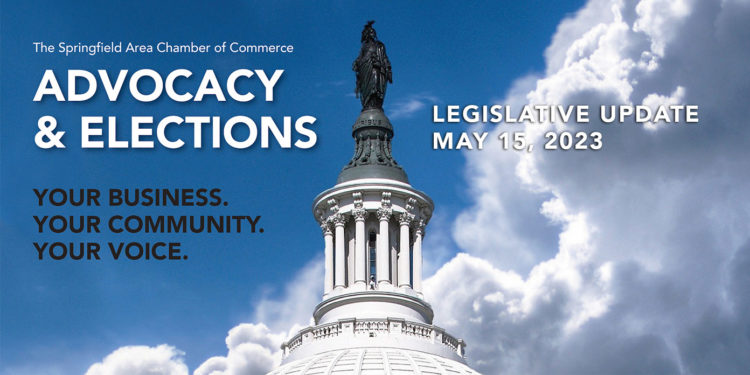Legislative Update: May 15, 2023

We’re monitoring Oregon’s 2023 legislative session for issues of impact and interest to our members. Here’s the latest update from our legislative counsel at the Oregon State Chamber of Commerce (OSCC).
Again this past week, the Senate lacked a quorum for each day the chamber tried to convene. Headed into today, three senators have hit nine unexcused absences (Sens Bonham, Boquist, Linthicum), while most of the rest of the Republican caucus continue to accumulate absences.
As a reminder, if and when a lawmaker reaches 10 unexcused absences, they are barred from running for re-election under a constitutional amendment passed last November. A legal memo paid for by walkout opponents was released this weekend and suggested, amid much speculation, that the new rules would survive a court challenge. As of this morning, it is unclear if weekend discussions between caucus leaders made any headway. The Senate is scheduled to convene this morning.
As we see it, there are really three scenarios that could play out this week:
1. Senators reach an agreement and are back at work.
2. Senators are close to an agreement and continue to spend the next week working to finalize an agreement. In this scenario, I would expect Senate Democrats to excuse those members who are close to reaching the 10-day absences.
3. Senate Republicans don’t show up on Monday and some of them hit the 10-day absence mark, likely cementing the Republican position that they aren’t returning to Salem for the 2023 session.
This situation will remain fluid likely for a few more weeks and possibly longer. The Republican walkout could definitely have a significant impact on a number of bills and policy issues, but it is too early to determine what that impact is.
If Republican Senators continue their walkout through the end of session, any bill that has not previously passed the Senate chamber will be dead. That includes nearly all budget bills. In this scenario, lawmakers will eventually need to reconvene for a special session to pass a budget. A continuing resolution funding government operations through September 15 previously passed both the House and Senate and is currently awaiting Governor Kotek’s signature.
Budget forecast this week. On Wednesday, lawmakers will hear the quarterly economic and revenue forecast. This is the final forecast before the constitutionally required adjournment date of June 25th, and this forecast will determine the numbers that budget writers will use to formulate agency budgets for the next biennium.
Early speculation suggests the revenue forecast will once again show growth, leading to an increased kicker as well as increased available revenue for state lawmakers. This is a two-edged sword, as more money often lessens the threat of tax increases, but can also mean that extra agency budget requests (such as DEQ programs) are given new life. We will share additional updates when the forecast becomes available.
CURRENT OSCC ISSUES
Title V Fee Increase (HB 3229): OSCC has long opposed the huge 80% increase for manufacturers in HB 3229. Last week we received a copy of a new amendment to HB 3229 that proposes a fee increase that is every bit as large as the original proposal. Under the new amendment, Title V fees would increase by 86% split over two years. OSCC continues to be opposed to this proposal due to the drastic nature of the increase and the lack of stakeholder engagement prior to session.
Hiring and Retention Bonuses (HB 3205): Legislation that would have clarified that hiring and retention bonuses are allowable under Oregon’s pay equity law was gutted by Senate Labor and Business Committee Chair Kathleen Taylor (D-Portland). Senator Taylor’s amendment replaces the bill that is strongly supported by OSCC with language that simply directs BOLI to study and make recommendations on the issue. OSCC no longer supports HB 3205.
Research & Development Tax Credit (SB 5): OSCC is closely following the discussions about re-instating a R&D tax credit for manufacturers. The current bill limits the tax credit to the semi-conductor industry, but legislators are hearing from all around the state that the credit should be available to all manufacturing.
Interstate Bridge Replacement (HB 2098): Establishing a plan for funding Oregon’s portion of the I-5 bridge replacement project is quickly becoming the focal point of the remaining weeks of this year’s session. Last week saw the first major public hearing on amendment language related to the project. Already, typical battle lines over union work requirements, tolling, project costs, and environmental impacts have come to the fore. OSCC is supportive of efforts to leverage the availability of significant one-time federal funds available to help complete the replacement of the current bridge, which has reached the end of its lifespan and is considered seismically unsafe.
Restrictions on Production & Fulfillment Quotas in Warehouses (HB 3568): OSCC is currently concerned with this bill as it assumes that workplace production quotas lead to unsafe workplaces. We are also concerned that the bill creates a never-ending cycle of potential retaliatory complaints against warehouse employers who use production or fulfillment quotas as a workplace management or productivity tool. OSCC opposes the bill in current form.
The Springfield Chamber of Commerce will be publishing the OSCC’s legislative updates weekly, or as received. Any opinions expressed or implied are those of OSCC and do not necessarily reflect those of the Springfield Chamber or its representatives. If you’d like more information, please visit our Advocacy & Elections Page.
Discover more from Springfield Bottom Line
Subscribe to get the latest posts sent to your email.






